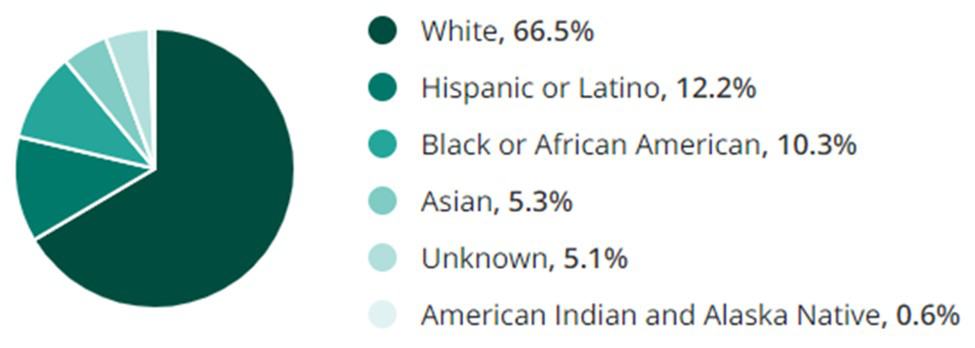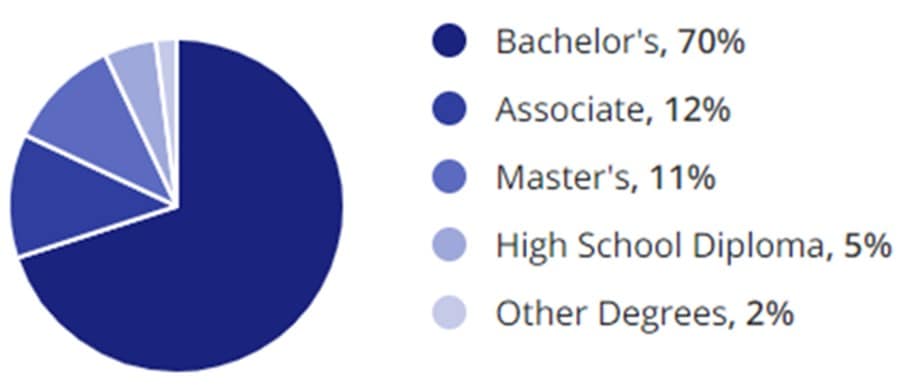Welcome to the ultimate guide for landing your dream media job. Whether you’re just starting, looking to pivot your career, or aiming to climb the ranks, this guide is your first step toward a successful future in media. The media sector is vibrant and diverse, offering a variety of paths from journalism and digital media to film production and public relations. You can find your niche and excel with the correct information and tools.
The landscape of media jobs is continually evolving, with digital transformation and shifting audience behaviors creating new opportunities and challenges. This guide provides a comprehensive overview of what it takes to thrive in this exciting field. From education requirements and areas of expertise to hiring trends and salary insights, we’ve got you covered. Plus, we delve into the demographics of the U.S. media industry to give you a clear picture of the current state of play.
Read on to discover the high-demand skills, explore the current and future outlook for media jobs, and tap into additional resources to support your career growth. We’ll also show how joining the Diversity Employment Community can enhance your job search and professional development. Your media dream job awaits—let’s get started!
Educational Requirements
Starting a career in media often requires a solid educational foundation. A bachelor’s degree in communications, journalism, or film is usually the starting point for those interested in media jobs. Beyond these degrees, specific certifications can enhance your skill set, particularly in digital media production and editing software, opening up opportunities in media buyer jobs and social media coordinator roles.
For individuals aiming at the dynamic landscape of the West Coast or specialized sports media jobs, additional training in digital marketing, sports journalism, or entertainment management could be beneficial. U.S. educational institutions offer courses and degrees tailored to these needs, providing theoretical knowledge and practical experience.
Furthermore, as the media industry rapidly evolves with new technology and platforms, staying current with industry standards through workshops, seminars, and online courses is crucial. It enhances your resume and ensures you remain competitive in a dynamic job market.
Areas of Expertise
The vast media industry offers various roles catering to different skills and interests. Here are some critical areas of expertise within the media sector:
- Journalism: This classic pathway involves reporting, writing, and editing news for various platforms. It remains central to the media profession.
- Broadcasting: For those interested in television or radio, broadcasting offers roles both in front of the camera and behind the scenes, making it an exciting field of work.
- Digital Media: With the rise of online platforms, creating and managing content for social media and websites has become crucial. Jobs like social media coordinator are in high demand.
- Film Production: This specialization involves working on the creation and production of films. It covers various positions, from independent shorts to blockbuster movies.
- Public Relations: PR professionals manage communication between organizations and the public, playing an essential role in shaping a company’s image and media presence.
Each of these areas requires a specific set of skills and knowledge. For example, journalism demands exceptional writing and critical thinking skills, whereas film production might need more technical abilities in editing and cinematography. No matter the path, all these roles contribute to the vibrant and diverse landscape of media jobs.
Demographics in the United States
The demographics within the U.S. media industry highlight its diversity across ethnicity, gender, and age. Understanding these demographics can provide insights into the sector’s inclusivity and offer a look into who narrates the stories that shape our society.
Ethnicity/Race:
The media field in the U.S. portrays a spectrum of ethnic and racial backgrounds, although there’s room for improvement in representation. The distribution features:
- White: 66.5%
- Hispanic or Latino: 12.2%
- Black or African American: 10.3%
- Asian: 5.3%
- Other (Including Unknown, Native Americans and Multiple Races): 5.7%
This mix underscores the ongoing efforts within the media industry to ensure a broader representation from various ethnic backgrounds, recognizing the crucial role diverse voices play in shaping narratives and reaching diverse audiences.

Gender:
When it comes to gender distribution, the media sector is nearly balanced, with:
- Male: 52.9%
- Female: 47.1%
This reflects the industry’s stride towards gender equality, with continuous efforts to close the gap and ensure equal opportunities for all genders, particularly in higher-level positions.

Age:
Age distribution in the media sector spans a wide range, attracting professionals of various ages, with an estimated average age of over 40. This includes:
- Young professionals who bring fresh perspectives and adaptability to the evolving media landscape.
- Experienced individuals contributing depth and expertise in storytelling, production, and audience engagement.
The diversity in age enriches the media industry, encouraging a blend of innovation and wisdom in content creation and distribution.

Salary Trends
The salary for media jobs in the U.S. fluctuates based on factors like the specific role, medium (e.g., print, digital, TV), location, and experience level. Generally, media professionals can anticipate a wide range of salaries:
- Entry-level positions: Starting around $40,000 annually.
- Mid-level roles: Salaries can range from $60,000 to $90,000.
- Senior positions or specialized roles (e.g., executive producers, media directors): Salaries can exceed $130,000 annually.
In specific fields like social media coordinator jobs, competitive salaries reflect the growing importance of online presence and digital marketing strategies. Similarly, the demand for talent in emerging media markets contributes to attractive compensation packages for West Coast media jobs, often higher due to the cost of living and the tech industry’s influence in regions like Silicon Valley.
It’s critical to note that ongoing learning and skill enhancement are crucial in salary growth within the media industry. Professionals who continuously update their skillsets, particularly in digital media, can expect significant earning potential increases over time.
Hiring Trends
The landscape for media jobs is ever-evolving, influenced by trends in technology, audience preferences, and content delivery methods. Here’s an overview of the current hiring trends in the media sector:
- Digital Shift: There’s a steady move towards digital and online platforms. Roles in digital media production, social media strategy, and content creation are seeing increased demand.
- Content is King: Quality content creation remains at the heart of the media industry. There’s a growing need for creative storytellers, video producers, and writers who can engage diverse audiences.
- Data-Driven Decisions: With the rise of big data, media organizations seek professionals who can analyze data to inform content strategies and business decisions, blending analytics with creativity.
- Freelance and Contract Roles: The gig economy influences media jobs, leading to more freelance, contract, and remote work opportunities. This trend offers flexibility for both employers and media professionals.
Overall, the demand for skilled media professionals remains strong, reflecting the industry’s adaptability to new technologies and changing consumer habits. As platforms evolve and new media emerges, professionals who keep pace with industry developments are poised for success.
Education Levels
The media industry places a significant emphasis on educational attainment, recognizing its role in preparing individuals for the challenges and opportunities of media careers. Here’s a breakdown of the academic levels commonly found within the sector:
- Bachelor’s Degrees: Most media professionals start with a bachelor’s degree in journalism, communications, film studies, or digital media. This level of education provides a foundational understanding of media concepts, tools, and practices.
- Master’s Degrees: Professionals looking to advance or specialize in areas such as media management or advanced digital production often pursue master’s degrees. These programs offer more profound knowledge and usually include practical, hands-on experiences in media projects.
- Certifications and Short Courses: Continuous learning is key in the fast-evolving media landscape. Digital marketing, video editing, or social media analytics certifications can enhance skills and open new job opportunities. Short online and in-person courses allow professionals to stay updated with the latest tools and trends.
While formal education is crucial, practical experience, internships, and portfolio development are equally essential in landing media jobs and advancing in the field. Media professionals should consider a balanced approach that combines education with real-world application.

Skills in Demand
In the dynamic media field, specific skills stand out for their demand among employers. As technology evolves and consumer preferences shift, professionals equipped with the following skills are highly sought after:
- Content Creation: The ability to produce engaging, high-quality content across various formats—articles, videos, podcasts—is crucial. Creativity and storytelling prowess are vital competencies.
- Digital Literacy: Proficiency in digital tools and platforms, including content management systems, social media, and analytics software, is essential. Understanding the digital landscape helps professionals reach wider audiences more effectively.
- Social Media Management: Given the centrality of social media in today’s media ecosystem, skills in creating, curating, and managing social media content are invaluable.
- Video Production and Editing: With the rise of video content, the ability to produce and edit videos is increasingly essential. This includes familiarity with video editing software and understanding video marketing strategies.
- Data Analysis: Media companies use data to inform content strategies and measure impact. Analytical skills, therefore, are crucial for making data-driven decisions.
- SEO Knowledge: Understanding search engine optimization techniques to increase online visibility and engagement is another critical skill in digital media.
Adaptability and a lifelong learning mindset are also vital, as the media sector is subject to rapid changes. Professionals who continuously upgrade their skills and adapt to new technologies and platforms will find the most success in media jobs.
Current & Future Media Jobs Outlook
The outlook for media jobs remains promising, characterized by rapid changes and new opportunities. As the industry continues to evolve, driven by digital transformation and shifts in consumer behavior, the demand for skilled professionals in various media roles is set to grow. Here are key trends influencing the future of media jobs:
- Digital Media Growth: The surge in digital content consumption fuels demand for roles in digital marketing, content creation, and social media management.
- Technological Advances: Emerging technologies like artificial intelligence, virtual reality, and augmented reality are creating new avenues for storytelling and content delivery, requiring professionals to acquire new technical skills.
- Consumer-driven Content: With audiences seeking more personalized and interactive content, media professionals must adapt by developing engaging content strategies that resonate with diverse user preferences.
- Freelance Opportunities: The gig economy is influencing the media job market, with an increase in freelance, contract, and remote work opportunities offering flexibility to both companies and workers.
The future for media jobs looks bright, with ample opportunities for those willing to adapt to the changing landscape and develop the necessary skills. Continuous learning and leveraging new technologies will be critical to success in this vibrant and fast-paced industry.
FAQ’s
What Degrees Are Best for a Career in Media?
Bachelor’s degrees in journalism, communications, film studies, or digital media are often the starting point. Specialized certifications and master’s degrees can also enhance career prospects.
Is Experience More Important Than Education in Media Jobs?
Both are crucial. Education provides a foundation, while experience, through internships or portfolio work, offers practical skills and insights into the industry.
How Can I Stay Updated With Industry Changes?
Follow industry news, participate in professional networks, and continuously learn through workshops, courses, and certifications relevant to your field.
Are There Opportunities for Remote Work in Media?
The media industry offers various remote work opportunities, especially in digital media, content creation, and social media management roles.
What Skills Are Needed for Digital Media Jobs?
Skills in content creation, digital literacy, social media management, video production, data analysis, and SEO are highly sought in digital media roles.
How Competitive Is the Media Job Market?
The media job market is competitive, yet growth opportunities exist for those who continuously develop their skills, adapt to new technologies, and demonstrate creativity and innovation.
Additional Resources
If you’re aiming to advance your media career, the following resources provide valuable information and support:
- The U.S. Bureau of Labor Statistics Occupational Outlook Handbook offers detailed information on media job prospects, salaries, and more, providing a solid industry overview.
- For educational materials and courses, edX features a range of free and paid courses from universities and colleges worldwide, including media and communication studies.
- The Poynter Institute provides journalists and media professionals with e-learning opportunities, seminars, and workshops to hone their skills.
- Networking and professional development opportunities can be found through organizations such as the National Association of Broadcasters, an advocate for the broadcast media industry.
- For those interested in the intersection of technology and media, the John S. and James L. Knight Foundation offers insights and funding for journalism projects that leverage the latest digital innovations.
These resources can be instrumental in building a successful media career, offering opportunities for learning, networking, and professional growth.
Conclusion
The media industry provides a stimulating and fulfilling career path that allows for artistic expression, storytelling, and fostering connections with audiences. Aspiring media professionals can thrive in this evolving landscape with the proper education, skills, and adaptability. To succeed in your media-focused diversity job search, keep learning, stay updated with industry trends, and build a professional network.
Don’t miss the chance to be part of a community that values diversity, creativity, and innovation. Join Diversity Employment today! By creating an account and uploading your resume, you’re simplifying your job search process, supporting our mission, and gaining access to a network that can propel your media career forward!




